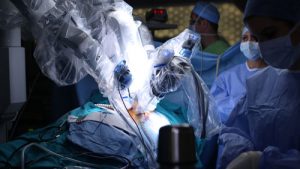Surgical Robot technology is not new. In 1985 a robot was used to perform a brain biopsy through CT guidance. In 1987 the technology was used in a laparoscopic procedure and in 1988 it was used to perform prostatic surgery.
Robotic technology advantages
The advantage to doctors, and there are many, to use robotic technology is that it provides an enhanced level of diagnostic abilities, is less invasive and is typically more comfortable for the patient.
Robots have been deployed in operating rooms to perform prostate surgery, hysterectomies, joint replacement, open heart surgery, fibroid removal and kidney surgery.
The surgeon can either control the robot while he is in another room or he can operate it in the same location with the patient. A benefit of the remote operation procedure is that a specialist can be “called in” to perform a surgery without having to travel to the patient. This can provide a more comfortable work option for the physician and help reduce fatigue because surgeries that last for hours are strenuous to even the best surgeons. Robots don’t experience hand fatigue nor are they prone to tremors after hours of a surgical procedure.
Robotic technology can improve patient care and may cut back on medical costs, but the price for many of these robotic devices can run from the hundreds of thousands to the million-dollar range. Because of the pricing, hospitals need to weigh the cost versus the benefit of the machines versus traditional doctor care for the patients. When they factor in that the healing time and potential trauma to the patient from a robotic-assisted surgery and the reduced number of days a patient has to be hospitalized, they may find the cost is worth it. Additionally, with a robotic device, there is a reduced need for personnel in the operating room.
There is also a learning curve for the surgeon, but as they become more comfortable with the technology and as more companies begin to manufacture them, it’s likely that robots will be used in most hospitals.
Universe Kogaku designs and manufactures optical lenses for medical, industrial, high tech and electronic applications. Standard and custom lens assemblies for scanners, CCTV, CCD/CMOS, medical imaging, surveillance systems, machine vision and night vision systems are available with 1000’s in stock.